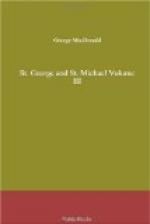‘Quid turbamini, et ploratis? puella non est mortua, sed dormit.’
He laid that book also down, fell on his knees, and prayed for her who was not dead but sleeping.
Dorothy, filled with awe, rather from the presence of the mother of the dead than death itself, and feeling that the mother would rather be alone with her dead, also left the room, and sought her chamber, where she threw herself upon the bed. All was still save the plashing of the fountain, for the music from the chapel had ceased.
The storm burst in a glare and a peal. The rain fell in straight lines and huge drops, which came faster and faster, drowning the noise of the fountain, till the sound of it on the many roofs of the place was like the trampling of an army of horsemen, and every spout was gurgling musically with full throat. The one court was filled with a clashing upon its pavement, and the other with a soft singing upon its grass, with which mingled a sound as of little castanets from the broad leaves of the water-lilies in the moat. Ever and anon came the lightning, and the great bass of the thunder to fill up the psalm.
At the first thunderclap lady Margaret fell on her knees and prayed in an agony for the little soul that had gone forth into the midst of the storm. Like many women she had a horror of lightning and thunder, and it never came into her mind that she who had so loved to see the horse spout was far more likely to be revelling in the elemental tumult, with all the added ecstasy of newborn freedom and health, than to be trembling like her mortal mother below.
Dorothy was not afraid, but she was heavy and weary; the thunder seemed to stun her and the lightning to take the power of motion from the shut eyelids through which it shone. She lay without moving, and at length fell fast asleep.
To the marquis alone of the mourners the storm came as a relief to his overcharged spirit. He had again opened his New Testament, and tried to read; but if the truths which alone can comfort are not at such a time present to the spirit, the words that embody them will seldom be of much avail. When the thunder burst he closed the book and went to the window, flung it wide, and looked out into the court. Like a tide from the plains of innocent heaven through the sultry passionate air of the world, came the coolness to his brow and heart. Oxygen, ozone, nitrogen, water, carbonic acid, is it? Doubtless—and other things, perhaps, which chemistry cannot detect. Nevertheless, give its parts what names you will, its whole is yet the wind of the living God to the bodies of men, his spirit to their spirits, his breath to their hearts. When I learn that there is no primal intent—only chance—in the unspeakable joy that it gives, I shall cease to believe in poetry, in music, in woman, in God. Nay, I must have already ceased to believe in God ere I could believe that the wind that bloweth where it listeth is free because God hath forgotten it, and that it bears from him no message to me.




